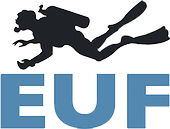EUF-Zertifizierung
Für höchste Sicherheit und Qualität bei Tauchausbildungen und Tauchbasen.
Die EUF-Zertifizierung ist eine Kooperation zwischen der European Underwater Federation (EUF) und Austrian Standards. Mit diesem Zertifikat können Tauchschulen, Tauchinstruktor:innen und Tauchbasen ihre Fachkompetenz und Servicequalität durch eine unabhängige Stelle bestätigen lassen.

Die Zertifizierung ist möglich für alle Organisationen, die Ausbildungen für Sporttaucher anbieten, sowie für Tauchbasen. Auf der Grundlage internationaler Standards werden das Qualitätsmanagement, die Qualifikationen und Kompetenzen der Ausbildenden sowie die Trainingsqualität evaluiert.
Sie interessieren sich für die Zertifizierung?
Senden Sie uns eine Nachricht – wir beraten Sie gerne.


